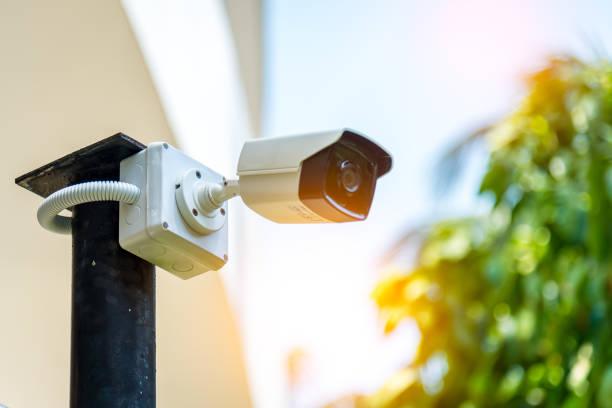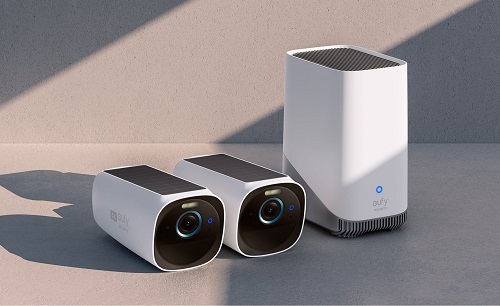“By 2023, the global solar power market was expected to surpass 194.75 billion U.S. dollars.” This incredible statistic highlights the growing reliance on renewable energy sources like solar power. One innovative application of this technology is in the realm of home security with solar wireless security cameras. These devices are not just a trend but a smart investment for those who want to secure their property while being environmentally conscious. Let’s dive into the pros and cons of these high-tech gadgets, review the top five best options available, and answer some common questions.

Pros and Cons of Solar Wireless Security Cameras
When considering any new technology, it’s essential to weigh the benefits against the potential drawbacks. Solar wireless security cameras are no exception.
Pros
1. Eco-Friendly:
One of the most significant advantages is their reliance on solar power. This reduces the carbon footprint and dependency on traditional electricity sources, making them a sustainable choice.
2. Cost-Effective:
Although the initial investment might be higher, solar wireless security cameras save money in the long run. They eliminate the need for constant battery replacements or extensive wiring installations, which can be both costly and time-consuming.
3. Easy Installation:
These cameras are designed for straightforward installation. With no need to worry about wiring and power sources, you can place them almost anywhere with good sunlight exposure.
4. Continuous Power Supply:
Solar panels charge the cameras during the day, ensuring they have enough power to operate throughout the night. This feature is particularly beneficial in remote areas where electrical wiring is not feasible.
5. Remote Monitoring:
Many solar wireless security cameras come with advanced features like remote monitoring via mobile apps. This allows you to keep an eye on your property from anywhere in the world.
Cons
1. Weather Dependent:
The efficiency of solar wireless security cameras is heavily dependent on sunlight. In areas with limited sun exposure or during long, cloudy periods, the cameras may not perform optimally.
2. Initial Cost:
The upfront cost can be higher compared to traditional wired or battery-operated security cameras. However, this is often offset by the long-term savings on energy bills and maintenance.
3. Limited Power Storage:
While solar panels do charge the cameras, the power storage capacity can be limited. Extended periods without sufficient sunlight might lead to power issues.
4. Potential Vandalism:
Since these cameras are often placed in visible areas to maximize sunlight exposure, they can be more susceptible to vandalism or theft.
5. Maintenance:
Regular maintenance of the solar panels is necessary to ensure they remain clean and efficient. Dust, debris, or snow can reduce their effectiveness.
Best Wireless Solar Security Cameras
Choosing the right solar wireless security camera can be daunting given the myriad of options available. Here are five top-rated models that offer a blend of reliability, features, and value.

eufyCam S330
If you’re looking for a security camera that offers outstanding performance and features, the eufyCam S330 is a top contender. This camera not only boasts 4K resolution but also provides advanced AI detection to differentiate between humans and other objects.
Pros:
4K Ultra HD: Crystal clear video quality.
AI Detection: Reduces false alerts by recognizing humans, vehicles, and pets.
Free Local Storage: No monthly fees for cloud storage.
Long Battery Life: The solar panel ensures continuous power, reducing the need for frequent recharges.
Cons:
Price: It’s on the higher end of the spectrum, but you get what you pay for in terms of quality and features.
The eufyCam S330 is an excellent choice if you’re serious about home security and don’t mind investing a bit more for superior quality.
Reolink Argus 2
The Reolink Argus 2 is another solid option for those seeking a reliable solar-powered security camera. Known for its flexibility and user-friendly design, this camera is perfect for both indoor and outdoor use.
Pros:
1080p Full HD: Provides clear and detailed video.
Starlight Night Vision: Delivers excellent low-light performance.
Wire-Free Installation: Easy to set up and move around as needed.
Two-Way Audio: Allows you to communicate with anyone on your property.
Cons:
Occasional Lag: Some users have reported slight delays in live streaming.
The Reolink Argus 2 strikes a balance between affordability and performance, making it an ideal choice for budget-conscious homeowners.
Arlo Pro 3
When it comes to premium wireless solar security cameras, the Arlo Pro 3 stands out with its impressive array of features and sleek design. This camera is perfect for tech enthusiasts who want the best of the best.
Pros:
2K HDR: Captures high-resolution video with excellent clarity.
160° Field of View: Wide-angle lens covers more area.
Integrated Spotlight: Enhances night vision and acts as a deterrent.
SmartHub: Provides robust connectivity and local storage options.
Cons:
Subscription Required: For full access to all features and cloud storage, you’ll need a subscription.
The Arlo Pro 3 is a powerhouse in the world of wireless solar security cameras, offering unparalleled performance and features for those willing to invest in top-tier technology.
Wyze Cam Outdoor v2
For those who want an effective security solution without breaking the bank, the Wyze Cam Outdoor v2 is a fantastic option. This camera offers great value with its blend of affordability and functionality.
Pros:
Affordable: One of the most cost-effective options on the market.
1080p HD: Provides clear video quality for its price range.
Weather-Resistant: Built to withstand various weather conditions.
Free Cloud Storage: Includes 14-day rolling cloud storage at no extra cost.
Cons:
Limited Features: Lacks some advanced features found in pricier models.
The Wyze Cam Outdoor v2 is perfect for those who need a basic yet reliable security camera without spending a fortune.
CoreCam Wireless Security Camera with Solar Charging Panel
Last but not least, the CoreCam Wireless Security Camera with Solar Charging Panel is a versatile and dependable choice for homeowners seeking comprehensive coverage.
Pros:
1080p HD Video: Clear and sharp video quality.
Solar Charging: Continuous power supply with the included solar panel.
Motion Detection Alerts: Receive instant notifications of any activity.
Easy Installation: User-friendly setup process.
Cons:
Average Night Vision: Night vision quality could be improved.
The CoreCam Wireless Security Camera with Solar Charging Panel offers solid performance and is a great middle-ground option for most users.
Conclusion
Solar wireless security cameras represent a fusion of technology and sustainability, providing an efficient way to protect your property while minimizing environmental impact. These cameras offer numerous benefits, from easy installation and cost savings to remote monitoring and continuous power supply. However, they also come with some limitations, such as weather dependency and initial cost.
Overall, if you’re looking to enhance your home security system with an eco-friendly option, solar wireless security cameras are worth considering. They not only safeguard your property but also contribute to a greener planet.
FAQ
Do wireless solar security cameras use a lot of Wi-Fi?
Wireless solar security cameras do require a stable Wi-Fi connection to transmit video footage and alerts to your mobile device. However, they typically don’t consume a significant amount of bandwidth. The exact usage depends on the resolution of the video and the frequency of motion detection alerts. For example, streaming high-definition video continuously will use more data compared to occasional motion-triggered recordings.
How far can a wireless solar security camera be from the router?
The distance a wireless solar security camera can be from the router depends on several factors, including the strength of your Wi-Fi signal, any physical obstructions (walls, floors), and the quality of the camera’s Wi-Fi receiver. Generally, most wireless cameras can effectively operate within a range of 150 to 300 feet from the router. For larger properties, you might consider using Wi-Fi extenders or mesh networks to ensure a robust connection throughout your area.
